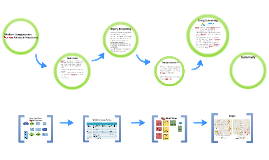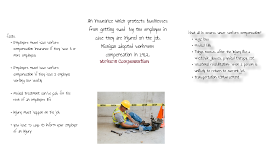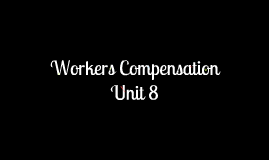Workers Compensation
Transcript: Workers Compensation Unit 8 Key Terms NO FAULT INSURANCE- a worker injured while at work and employed in an industry protected by the act can get benefits. It doesn't matter who caused the accident. The injured worker and employer cannot sue each other. Let's Role play! -Alex is a worker working for Caylee's Tube Sock industry inc. and while working on the job, she stabs her finger with a sewing needle. Her finger is bleeding and she may have to get stitches... -Let's see how it turns out... Collective Liability: All employers who operate in industries covered by the act pay for the cost of insurance. The provincial government does not fund the WCB. Employers pay all premiums. -ROLE PLAY #2: -Alex is playing the role of a Government Person. Caylee, being the employer of her weird Tube Sock Company, is asking Alex to pay for her WCB bill, because she does not know that the government does NOT pay for it for her. What Benefits Did Injured Workers get during the Industrial Revolution? During the Industrial Revolution, there was a multitude of new job opprotunties. Workers were faced with exceedingly poor working conditions. For the first time, workers used power-driven machinery. Accidents were common. If a worker was injured, they recieved little to no help. Many employers thought workplace injuries and deaths were not their concern. To get any help from employers, injured workers and their famlies had to go to court to prove the employer was at fault. What is the WBC ? The WCB stands for the Workers Compensation Board Each Canadian Province has a similar WCA; Each act permits the setting up of a WCB; an organization that manages the WCA insurance business to protect employers and workers when workplace injuries happen. Why was the first Workers Compensation Act created in 1915? In the early 20th century, Canadian Law creators realized that workers needed to be protected. They knew some form of pay had to be available for injured workers and for the familes of workers killed on the job. The WBC assists injured workers by providing benefits such as; Wage Replacement: Injured Workers get money to replace lost pay due to injury For example, disabled workers can receive up to 90 percent of their net, which is the maximum amount This benefit is based on the amount of money workers earned at the time they were injured Medical expenses: All medical costs related to the workplace accident are paid by the WBC Return to Work Planning: WCB case managers talk to injured workers, their employers and health care providers The managers then make decisions about the type of work injured workers can do, whether or not workers can return to the job they were attending before being injured. If a workers can perform the same job, the case manager arranges treatment to help the injured worker recover. A case manager can also ask an employer if an injured worker can: .work less hours .perform fewer or different tasks . return to work earlier Vocational Services: If injured workers cannot return to their jobs because of their injuries, the WBC helps these workers learn other types of work Fatality Benifits: If a worker dies from workplace injuies, the WBC will help pay funeral costs The dead worker's family will also get the money that the worker would have recived if still living The Different Types of Coverage All new employers in compulsory industries must open a WBC or similar account within 15 days of employing their first worker(s), or other wise known as Compulsory Coverage. Employers in industries not covered by the WCB Act can apply to have workers' compensation insurance to protect their workers. This is also known as Voluntary Coverage. Bussiness owners (indivuals, partners, and directors) can buy workers compensation insurance for themselves as well, this type of Coverage is called Personal Coverage. This type of coverage offers the same insurance benefits to owners that workers get when injured on the job. They will need to purchase this because they are not covered automatically by the WBC for work related injuries. If a worker is injured on the job, a employer should write down all possible information about the accident, and complete an Employers Report of injury form. This form must be sent to the WBC within 72 hours of becoming aware of the injury. Question # 6: 1. Inform your employer and ask for a few days off. 2. Get your employer to complete and send an Employers Report of injury form to the WBC within 72 hours of the injury. 3. You yourself must also complete a Worker's Report of Injury form and send it to the WBC within 72 hours fo your injury. 4. Tell your doctor of your injury and get them to file a report with the WBC within 48 hours of your injury. 5. Vist a Chiropractor or possibly get a back massage. 6. Do not attempt any strenuious work until you feel better. Info Time! We need 4 VOLUNTEERS! Anybody? Anybody? Alright, here’s how it’s going to work. Student 1: You had a sheet of metal drop onto your

















